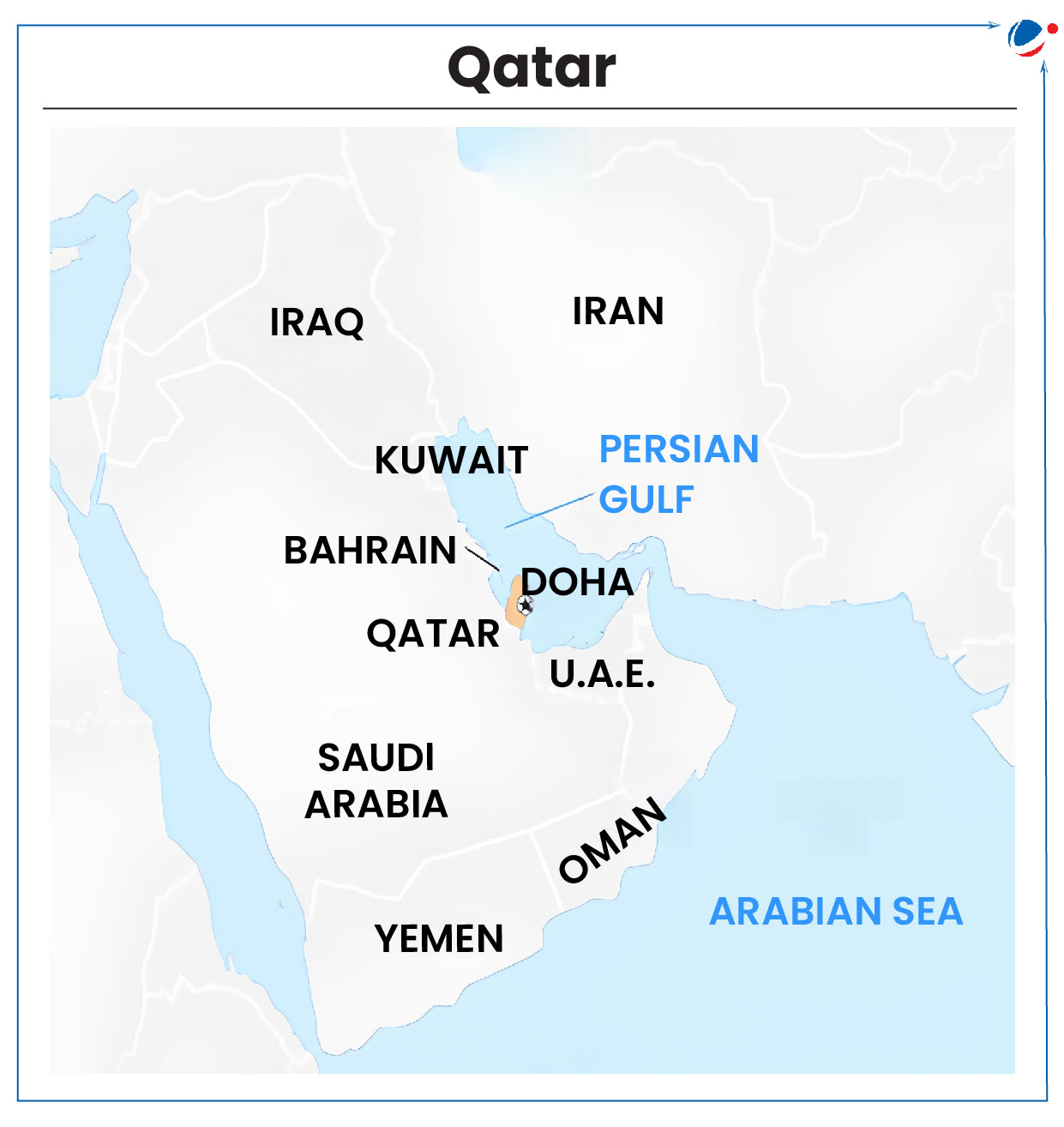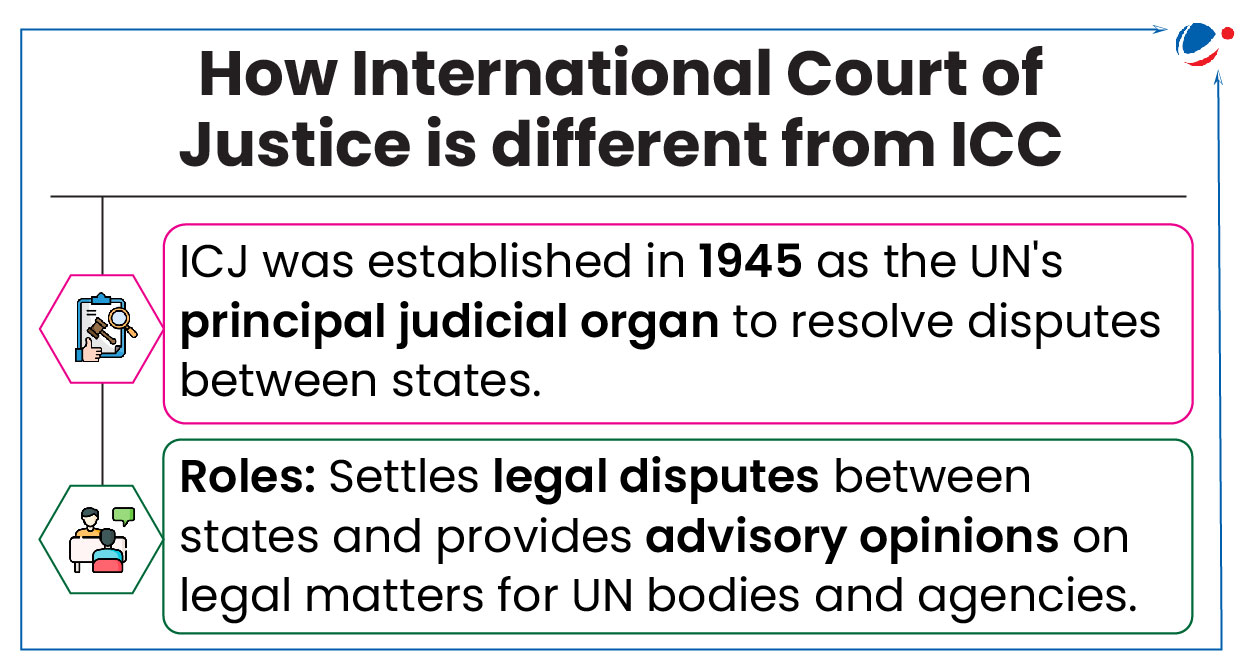
Elevation was done during state visit to India by Amir of Qatar with a focus on strengthening cooperation in trade, energy, investments, technology, food security, and people-to-people ties.
- Both sides also aimed to double bilateral trade to $28 billion in five years.
Other Key outcomes of Visit:
- Two MoUs signed to strengthen the strategic partnership, covering double taxation avoidance and fiscal evasion prevention.
- Additional MoUs signed between Qatari Businessmen Association and CII, and between Invest Qatar and Invest India to boost business and investment collaboration.
India Qatar Ties
- Economic Ties: Bilateral trade is USD 14.08 billion (2023-24). (With an effective trade deficit for India).
- India was among Qatar's top three export destinations and is also among top three sources of Qatar’s imports (2022-23).
- Energy Ties: Qatar is India's largest LNG supplier, providing over 40% of imports.
- Defense Ties: India-Qatar Defense Cooperation Agreement was extended for five years in 2018.
- Bilateral Exercises: Za’ir Al Bahr (Naval).
- India also regularly participates in the biennial Doha International Maritime Defense Exhibition and Conference (DIMDEX) in Qatar.
- Cultural Relations: Regular exchanges and activities under the 2012 Agreement on Cultural Cooperation, with the Indian Cultural Centre active in Qatar.
- People-to-People Ties: A vibrant Indian community of over 830,000 in Qatar strengthens cultural bonds.
Article Sources
1 sourceMinistry of Youth Affairs and Sports has hosted the first-ever Bay of Bengal Initiative for Multi-Sectoral Technical and Economic Cooperation (BIMSTEC) Youth Summit in Gandhinagar, Gujarat.
- Its goal is to strengthen youth collaboration across region and facilitating exchange of youth-led initiatives among BIMSTEC Member Countries.
About BIMSTEC (Secretariat: Dhaka, Bangladesh)
- Genesis: Established in 1997 with the signing of Bangkok Declaration.
- Members: Bangladesh, India, Sri Lanka, Thailand, Myanmar, Nepal, Bhutan.
- Objective: Promote rapid economic development, social progress, and ensure peace and stability across Bay of Bengal region.
- 7 focus area: Trade; Environment and Climate Change; Security; Agriculture and Food Security; People-to-People Contact; Science, Technology, and Innovation; Connectivity.’
USA President signed an executive order sanctioning International Criminal Court (ICC).

- The order imposes financial and visa restrictions on individuals and their families who assist in ICC investigations of American citizens or allies such as Israel.
International Criminal Court (Headquarter: Hague, Netherlands)
- It is the world’s first permanent international criminal court.
- Founding Treaty: Rome Statute (adopted in 1998 entered into force in 2002).
- Type of Crimes dealt: Genocide, War Crimes, Crimes against Humanity & Crime of Aggression.
- Membership: 125 countries
- India, Israel, the US, Russia and China are not parties to the Rome Statute.
- Recent Members: Malaysia (2019) Ukraine (2025).
- Management: The Assembly of States Parties is the Court's management oversight and legislative body.
- It is composed of representatives of the States which have ratified or acceded to Rome Statute.
- Official languages: English, French, Arabic, Chinese, Russian and Spanish.
Structural Issues in functioning of ICC
- High dependence on state cooperation as it lacks executive power for arrests and evidence collection.
- Political Pressure: It often gets caught between power politics and human rights and is often used by some States for targeting opponents.
Three countries (Mali, Burkina Faso and Niger) under military rule have officially left West African regional bloc, ECOWAS, following diplomatic tensions.
About ECOWAS (Hq: Abuja, Nigeria)
- Genesis: 1975
- Aim: Promote economic cooperation among member states in order to raise living standards and promote economic development.
- Citizens of ECOWAS countries have the right to live and work in all member states, along with free circulation of goods.
- Members: 12 (after the current withdrawal)
- Benin, Cabo Verde, Cote d’Ivoire, The Gambia, Ghana, Guinea, Guinea-Bissau, Liberia, Nigeria, Senegal, Sierra Leone, and Togo.
Article Sources
1 sourceRecently, Brazil approved entry into OPEC+.
About OPEC
- It is a permanent intergovernmental organization of 12 oil-exporting developing nations.
- India is not a member.
- Genesis: It was created at the Baghdad Conference in 1960, by Iran, Iraq, Kuwait, Saudi Arabia and Venezuela.
- Objective: To co-ordinate and unify petroleum policies among Member Countries, in order to secure fair and stable prices for petroleum producers.
- HQ: Vienna (Austria)
- OPEC+
- In response to falling oil prices driven by significant increase in U.S. shale oil output, OPEC signed an agreement with 10 other oil-producing countries in 2016 to create OPEC+.







